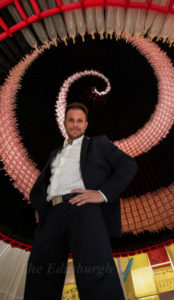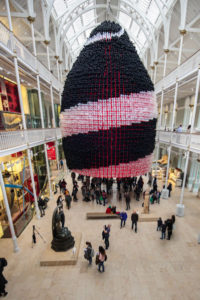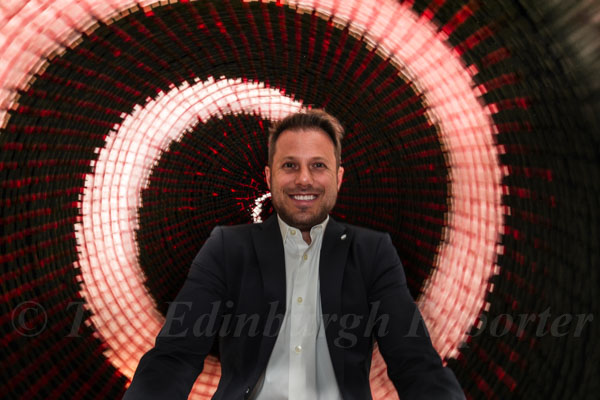‘Event Horizon’ Hoves into View at the Museum
Jason Hackenwerth’s biggest ever sculpture unveiled at the National Museum of Scotland
Unveiled today (6th April), ‘Event Horizon’ is one of the main highlights of the 2018 Edinburgh International Science Festival. The revolving artwork, powered by EDF Energy, is Jason’s largest ever featuring over 25,000 balloons and was created by a team of 13 people working for approximately 50 hours each over a total of 6 days. Event Horizon is now available to view until 22 April.
Jason Hackenwerth’s Pisces wowed Science Festival audiences in 2013. His new sculpture, descending from the ceiling of the Museum’s Grand Gallery, is a collaborative work involving 13 local art and science fans from various backgrounds: science communications, history of art and filmmaking, to name but few.
 Jason Hackenwerth’s new sculpture is part of Existence: Life and Beyond a new Science Festival-created interactive exhibition which opened at the National Museum of Scotland on 31 March. It guides audiences on a fascinating journey from the origins to the future of life, but not necessarily as we know it!
Jason Hackenwerth’s new sculpture is part of Existence: Life and Beyond a new Science Festival-created interactive exhibition which opened at the National Museum of Scotland on 31 March. It guides audiences on a fascinating journey from the origins to the future of life, but not necessarily as we know it!
Existence: Life and Beyond is part of Scotland’s Year of Young People 2018 and has been programmed with assistance from the Science Festival’s Youth Consultation Group. This group of 12 young people closely works with the Science Festival team to create content with and for them and their peers, helping connect the Festival with teen audiences. The Science Festival’s Youth Consultation Group are interested in getting people thinking about what life means, and how we perceive the intelligence of computers. They will be presenting online examples of AI creativity and machine learning, asking visitors to interact and question how close computers can get to exhibiting human-like intelligence.
The exhibition is developed with support from Creative Scotland through the Scottish Government’s Edinburgh Festivals Expo Fund and supported by the Year of Young People 2018 event fund, managed by EventScotland, part of VisitScotland’s Events Directorate.
Culture Secretary Fiona Hyslop said: “This unveiling of Jason Hackenwerth’s sculpture as part of this year’s Edinburgh International Science Festival is really exciting, merging art with science – and certainly one of the highlights of the festival’s rich programme of events. I commend the Science Festival for their continued commitment to ensuring international audiences come together in Scotland every year.
“I am pleased that the Scottish Government supported this year’s edition of the Festival by providing £130,000 Expo funding for Existence: Life and Beyond and Synthetica. As we celebrate 2018 Year of Young People, this funding will ensure the festival can  continue to present cutting-edge technology showcase and innovative events for our teenagers and young people.”
continue to present cutting-edge technology showcase and innovative events for our teenagers and young people.”
Experiential artist Jason Hackenwerth said: “I am very pleased to be back at the Science Festival with my biggest work yet, Event Horizon. Using balloons to make sculptures has magical results as well as built-in challenges: the works are instantly recognisable as an exuberant celebration of life, and require no deep understanding of art to enjoy, but are temporary. This fleeting fact increases its rarity and urgency to see it while it lasts. I hope the Science Festival audiences will enjoy getting lost in the gigantic rotating chasm of the Event Horizon.”
Amanda Tyndall, Festival and Creative Director at Edinburgh International Science Festival said: “I can’t express how delighted we are to have Jason back with us in this very special 30th birthday year. It is with projects like this that see science merge with the arts and digital and creative industries that we reach new audiences, keep innovating and try to ensure we are around for the next 30 years and beyond.”
Ellie Armstrong was one of the 13 people who worked as an Artist’s Assistant with Jason Hackenwerth on Event Horizon. She usually works as a science communicator at the Science Museum London, and is writing a PhD on how curatorial ideas and directions in the arts could be used to pluralise the science museum space.
Ellie said: “I got involved with Event Horizon because I’m interested in how we imagine areas of science we simply can’t experience. By building Event Horizon, we are inviting people to speculate and imagine what it’s like to go to places that cannot be reached and question what might happen there.
“The sheer scale of the project and the fact that it’s made of familiar balloon materials to children means that there’s an element of it being relatable to their experience but also so completely different that everyone stops and stares. Balloons are normally thought to be light and thin, but Event Horizon is also demonstrating the surprising strength of the balloons we’re using and their weight when there are so many of them.
“I’ve really enjoyed being involved with the Event Horizon team and I’m excited to see the project completed!”
Existence: Life and Beyond also features interactive exhibition pods and two specially-commissioned installations: Dennis and Debbie Club bring AI Awakening to allow audiences to step into the mind of an AI bot. While AN1MAL, an installation by Roy Shearer and Fergus Dunnet, presents a fantastical robotic creature that mimics animal behaviour in response to the actions of the viewer.

